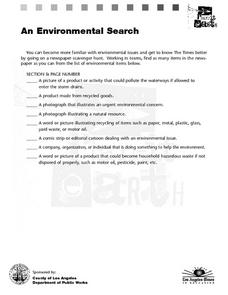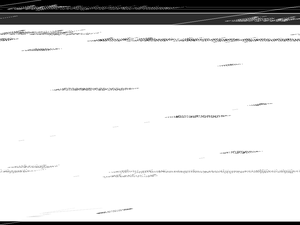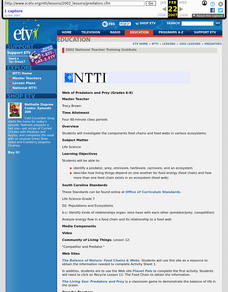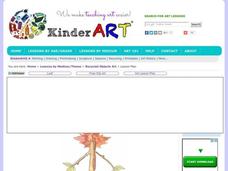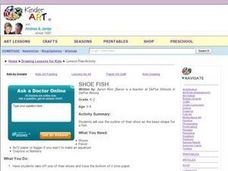Curated OER
Got the Whole World in My Hands
Young scholars review factors that threaten survival of different species. this lesson plan is part of a multi-segmented unit on animal survival.
Curated OER
Learning to Live Responsibly Within One's Personal Resources
Students explore survival techniques in the light of their own values and personal situations. The differences between needs and wants and how consumerism effects the environment forms the main focus of this three lessons unit.
Curated OER
An Environmental Search
High schoolers research the environment in this lesson. They find the section and page number of items listed on the worksheet. They work together in groups to find the information.
Curated OER
Giving Back
Learners research the start of the March of Dimes and discuss the benefits of their actions when contributing to a charity. Students continue the lesson by calculating how much money would have been collected in a week, month, and year...
Curated OER
Water Cycle
Third graders explore the water cycle and place pictures of the water cycle in sequential order. They investigate a problem and determine if it is reasonable or not to believe that there is water in air to cause a puddle. ...
Curated OER
Shape Walk
Learners take a field trip to a local park or beach to collect objects. They practice counting the objects and put them into categories according to type of shape like a cone, cylinder, etc... As an extension to the lesson students could...
Curated OER
Plant a Seed
Students complete a seed and plant growth activity. In this plant growth lesson, students read about Lady Bird Johnson and then answer questions about her role in the beautification and the environment. Students participate in a seed...
Curated OER
The Perils of Drinking Water
Students determine the presence of drugs in water. In this chemistry lesson, students experiment on water samples using thin layer and column chromatography. They determine the concentration of drugs present using graphical analysis.
Curated OER
Pendemonium: The Italian Job
Discover how to use prefixes and suffixes to determine the meaning of unfamiliar words. The group views a jovial video on the topic, and then they create a chart of prefix and suffix meanings to identify the meanings of words in a social...
Curated OER
Pollution
Young ecologists investigate some of the many ways that human activities adversely affect the environment. After identifying the main types of pollution (air, water, soil), 3rd graders fill in a Venn Diagram by pasting cut-out pictures...
Curated OER
Clowning Around: Drawing
Kids create a clown out of shapes. They work to show emotions while practicing their drawing skills. Pupils use circles, triangles, squares, oil pastels, and their imagination to draw, color, and decorate a sad or happy clown. Tip: Have...
Curated OER
What's Outside the Window
What do your students see when they look outside the window? This project lets their imagination go wild, and lets you see what kind of daydreaming they do best. They each draw, paint, and color an image of what they imagine as they are...
Macmillan Education
Skills and Attitudes
What kinds of skills and attitudes are valued in a work environment? Using this set of worksheets and collaborative activities, your pupils will develop important life skills and consider what is necessary for getting and keeping a job.
Macmillan Education
Teamwork
Learners develop self-awareness and discuss the importance of cooperation and communication through worksheets and hands-on, collaborative activities.
Curated OER
Mexican Metal Tooling
Metal work can be a wonderful way to expose learners to Mexican folk art. This resource provides all the necessary steps for creating Mexican metal tooling with your art class. Images, web links, recommended books and products make...
Curated OER
Owls: Top of a Food Chain
Although written for middle schoolers, there is no reason that a 3rd, 4th, or 5th grader could not also learn about food chains through the dissection of owl pellets. After you introduce the topic, learners complete an owl research...
University of Colorado
Terra Bagga
Earth's magnetic poles switch positions about every 200,000—300,000 years. In the activity, groups create a planet with a magnetic field. Once made, they use a magnetometer to determine the orientation of the planet's magnetic field....
Curated OER
Web of Predators and Prey
Students investigate the components food chains and food webs in various ecosystems. They describe how living things depend on one another for food energy (food chain) and how more than one food chain exists in an ecosystem
Curated OER
Leaf People
Kids create leaf people out of sticks, glue, and leaves. They use their imagination to construct leaf people and then glue them onto construction paper. Tip: Extend this craft by incorporating writing. Have learners write a short story...
Curated OER
Puzzle Trees
Elementary artists use a collage and multi-media technique to create textured trees. They study the fall trees, discussing texture and what bare trees look like. They then use a variety of materials to create a textural piece.
Curated OER
Face Study: Draw the Other Half
Build fine motor, spatial, and drawing skills by having the class complete the other half of a portrait. They choose an image of a face from a magazine, then attempt to draw the other half of the face as accurately as they can. Two book...
Curated OER
Glue Fish
Get out the glue and those oil pastels its time for an art project. The class explores shape, art, and color as they draw fish with glue, let them dry, and then color them as they wish. This project would be wonderful after discussing...
Curated OER
Shoe Fish
Fishy, fishy, fishy, fish! Kids take off their shoes and trace them to create fish for a large aquarium art project. Each traced shoe shape is decorated with gills, fins, scales, and eyes, then hug on an aquarium background. Three book...
Curated OER
Dragonfly Sculptures
Art projects are great when they apply to other subjects. First study insects, their parts, and their habitats. Then have little ones create a dragonfly. They use clothes pins, raffia, pipe-cleaners, and paint to construct their...
Other popular searches
- Recycling Lessons for Art
- Recycling Lessons Plan
- Recycling Lessons Plan Free
- Art Recycling Lessons
- Esl Lessons Science Recycling




